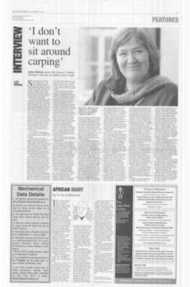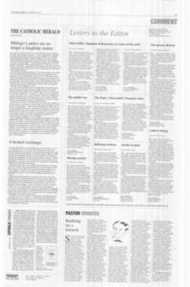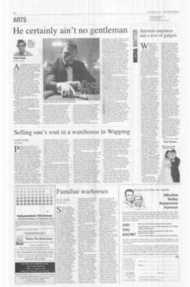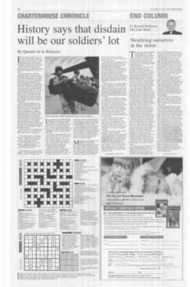Page 5, 24th November 2006
Page 5

Report an error
Noticed an error on this page?If you've noticed an error in this article please click here to report it.
Tags
Share
Related articles
Vatican Supports Scots Over Trident
Bishops Call For Total Nuclear Disarmament
The Mushroom Cloud That Hangs Over The Nuclear Dilemma
The Pope And Nuclear War
The Nuclear Dilemma
`The biggest moral issue in the world'
anadian Senator Douglas Roche, papal adviser on nuclear disarmament, is deeply troubled about the world's attitude to nuclear weapons. During an interview last week discussion turned to the subject of plans to replace or renew Britain's Trident nuclear weapons system. He wondered why some Catholics in Britain still supported the idea. Perhaps. it was put to him, the reason was that many still sympathised with Margaret Thatcher's dictum that nuclear weapons have been the most effective deterrent. The senator sat back in his chair in a stony silence. You could almost see the smoke coming out of his ears.
For Senator Roche, and many like him, the world is in a "second nuclear age", one that is "extremely serious" and presents the "single biggest moral issue in the world".
Nuclear weapons, he urges, are becoming permanent instruments of military policy and are no longer seen as a deterrent but rather used for fighting purposes. The 1968 Non Proliferation Treaty, which was supposed to lead nuclear weapons states towards disarmament, is in tatters. The US continues to move ahead with "bunker busting" nuclear weapons and Britain looks set to embark on a £20 billion renewal of Trident over 30 years, in effect turning its back on the treaty.
Meanwhile, North Korea has successfully tested its fist nuclear weapon, Iran is moving headlong with a suspected nuclear weapons programme, and Russia continues play host to a black market in nuclear technology.
The Holy See and the UN have, unsurprisingly, become increasingly alarmed. Archbishop Celestino Migliore, the Holy See's permanent representative at the UN, and the UN's Secretary General Kofi Annan, recently warned the world that it is "sleepwalking" down the road of nuclear proliferation and thereby greatly increasing the risk of nuclear catastrophe.
In strong words earlier this year, Pope Benedict XVI warned governments which base their security on nuclear weapons are pursuing a policy that is "not only baneful but also completely fallacious". The resources, he said, could better be used to help the poor.
For Senator Roche, who was in Rome to address a Nobel Laureate peace conference hosted by former Soviet leader Mikhail Gorbachev, the risks of maintaining the status quo are far greater than working towards the abolition of nuclear weapons. He sees it as the duty of religions to speak out and warn of the dangers and he would like to see many more cardinals and bishops in nuclear-armed states taking more of a stand.
He praised Cardinal Keith Patrick O'Brien for leading Scottish bishops to resist the Trident proposals and put the silence of English and Welsh bishops until this week down to internal divisions. He speaks of Pope John Paul II's statement in 1982 which stressed that without progress or will towards disarmament, possession of nuclear weapons is no longer moral.
However, the moral component of the issue is hardly debated with the Holy See. "We're not really focused on it systematically as it's unlikely we'll be able to effect a change of policy on either side — the positions are pretty entrenched," says one foreign diplomat.
Another, oddly, reasoned that it was an internal matter and therefore out of the realm of the Holy See. But divisions within the Church over the nuclear issue also don't help. The "balance of power" argument (that non-nuclear nations will try to match their nuclear-armed counterparts) is unconvincing for some who also believe that to disarm now, when threats from "rogue states" are on the increase, would be suicidal.
"National security is a moral issue: it's not just about realpolitik," says Kishore Jayabalan of the Acton Institute for the Study of Religion and Liberty. "Government leaders have a moral obligation to protect their citizens."
He believes Senator Roche's position is "absolutist" (that mere possession of nuclear weapons is immoral), and that the United States, as leader of the free world, had to respond the way it did after 9/11. However, he skated over the immorality of rejecting multilateral disarmament.
The hope now is that all these tough moral questions will be fully thrashed out in the forthcoming debate on Trident, though whether the Government and MPs will pay much attention to them is another question altogether.
Rome Correspondent: Edward Pentin E-mail: [email protected]
blog comments powered by Disqus

















